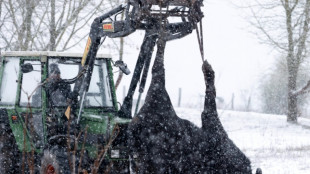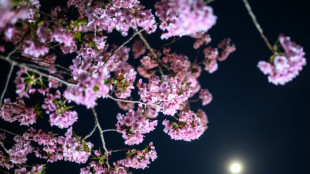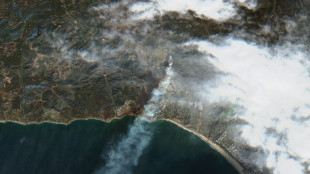
-
 Tech sector's energy transition draws attention at Vegas show
Tech sector's energy transition draws attention at Vegas show
-
Five things to know about New Glenn, Blue Origin's new rocket

-
 Blue Origin set for first launch of giant New Glenn rocket
Blue Origin set for first launch of giant New Glenn rocket
-
Dutch police detain hundreds at climate protest

-
 Germany battles to secure stricken 'Russian shadow fleet' oil tanker
Germany battles to secure stricken 'Russian shadow fleet' oil tanker
-
Malala Yousafzai 'overwhelmed and happy' to be back in Pakistan

-
 'Education apartheid': schooling in crisis in Pakistan
'Education apartheid': schooling in crisis in Pakistan
-
Smart glasses enter new era with sleeker designs, lower prices

-
 Supreme Court looks poised to uphold TikTok ban
Supreme Court looks poised to uphold TikTok ban
-
2024 hottest recorded year, crossed global warming limit

-
 Germany reports foot-and-mouth disease in water buffalo
Germany reports foot-and-mouth disease in water buffalo
-
US hikes reward for Maduro arrest after 'illegitimate' swearing-in

-
 Robots set to move beyond factory as AI advances
Robots set to move beyond factory as AI advances
-
Pro-Russian disinformation makes its Bluesky debut

-
 UK gas reserves 'concerningly low', warns biggest supplier
UK gas reserves 'concerningly low', warns biggest supplier
-
2024 warmest year on record for mainland US: agency

-
 Meta policy reversal puts question mark on future of fact-checking
Meta policy reversal puts question mark on future of fact-checking
-
Meta policy reversal puts question mark on furure of fact-checking

-
 Strong US jobs report sends stocks sliding, dollar rising
Strong US jobs report sends stocks sliding, dollar rising
-
US hiring beats expectations in December to cap solid year

-
 UK gas reserves 'concerningly low': Biggest supplier
UK gas reserves 'concerningly low': Biggest supplier
-
Global stocks mostly fall before US jobs data

-
 Ubisoft: the 'Assassin's Creed' maker targeted by suitors
Ubisoft: the 'Assassin's Creed' maker targeted by suitors
-
Stock markets drift lower as US jobs data looms

-
 Pakistan flight departs for Paris after EU ban lifted
Pakistan flight departs for Paris after EU ban lifted
-
Nobel laureate Malala Yousafzai to visit native Pakistan for girls' summit

-
 AI comes down from the cloud as chips get smarter
AI comes down from the cloud as chips get smarter
-
Tajikistan bets on giant dam to solve electricity crisis

-
 Uruguay bucks 2024 global warming trend
Uruguay bucks 2024 global warming trend
-
Last 2 years crossed 1.5C global warming limit: EU monitor

-
 Japan 'poop master' gives back to nature
Japan 'poop master' gives back to nature
-
US Supreme Court to hear TikTok ban case

-
 US Fed's December rate cut should be its last for now: official
US Fed's December rate cut should be its last for now: official
-
Paris Hilton among celebrities to lose homes in LA fires

-
 Airbus boosts plane deliveries in 2024
Airbus boosts plane deliveries in 2024
-
Ubisoft reviews restructuring options, postpones new Assassin's Creed

-
 Lamborghini sets new sales record amidst hybrid push
Lamborghini sets new sales record amidst hybrid push
-
Lebanon army chief Aoun becomes president after two-year vacancy

-
 US emissions stagnated in 2024, challenging climate goals: study
US emissions stagnated in 2024, challenging climate goals: study
-
Lebanon army chief short of required majority in first round of president vote

-
 Global stock markets mixed tracking US rates outlook
Global stock markets mixed tracking US rates outlook
-
Lebanon meets to finally elect president after two-year vacancy

-
 Celebrities flee Los Angeles fires, lose houses as Hollywood events scrapped
Celebrities flee Los Angeles fires, lose houses as Hollywood events scrapped
-
Japan startup hopeful ahead of second moon launch

-
 Ukraine allies to hold last defence meet before Trump takes office
Ukraine allies to hold last defence meet before Trump takes office
-
Myanmar military adopts anti-junta fighters' drone tactics

-
 CES tech looks to help world's aging population
CES tech looks to help world's aging population
-
Rubber tappers forge sustainable future in Amazon

-
 US astronauts upbeat seven months into eight-day mission
US astronauts upbeat seven months into eight-day mission
-
Extreme weather, suburban sprawl fuel LA's wildfires

| NGG | -3.3% | 56.13 | $ | |
| RBGPF | 100% | 60.49 | $ | |
| SCS | -3.01% | 10.97 | $ | |
| RYCEF | -0.42% | 7.07 | $ | |
| RIO | 0.36% | 58.84 | $ | |
| VOD | -1.99% | 8.05 | $ | |
| GSK | -1.99% | 33.09 | $ | |
| CMSC | -0.79% | 22.92 | $ | |
| BTI | -2.34% | 35.9 | $ | |
| BP | 0.54% | 31.29 | $ | |
| BCC | -1.31% | 115.88 | $ | |
| RELX | -0.86% | 46.37 | $ | |
| BCE | -2.92% | 22.96 | $ | |
| AZN | 0.64% | 67.01 | $ | |
| JRI | -1.16% | 12.08 | $ | |
| CMSD | -0.65% | 23.25 | $ |

Ethiopia's famed honeybees make slow recovery from war
In his stone house perched on a hill in northern Ethiopia, Amanuel Hiluf puts on his protective suit, carefully adjusting the hood and gloves.
"We have to hurry up, it starts to be hot, and the bees will be upset," he says.
In his garden in Hawidela, a village about an hour from Mekele, capital of the Tigray region, the beekeeper has about 40 hives from which clouds of bees are soon escaping.
For nearly 20 years, his hives have produced white honey, a creamy, highly prized variety for which the northernmost region of Ethiopia is famous.
Amanuel, 42, remembers a time when they produced "in abundance".
But that was before the war in Tigray between federal government troops and Tigrayan rebels that raged from 2020 to 2022, which forced him to flee with his wife and children.
"In this region, there was a lot of damage," he says, pointing to a hill from which shells were fired.
When he returned a few months later, all his hives -- and his livelihood -- had been destroyed.
Before the war, he could produce about 600 kilos (1,300 pounds) of white honey each year and earn some 900,000 birr (about $7,500 at today's rates).
That is a considerable sum in a country where more than a third of the population lives below the poverty line, according to the World Bank.
When he resumed production, Amanuel said he had lost 95 percent of his earnings. He has gradually rebuilt the hives, but still only produces 100 kilos.
- 'Sound of misery' -
The situation is replicated across Tigray.
Goshu Welealeabzgi, a specialist for the Tigray authorities' Bureau of Agriculture and Natural Resources, says 40 to 60 percent of hives were destroyed by the war.
Before the conflict, he estimates there were 500,000 colonies in Tigray, with 200,000 people directly dependent on beekeeping, in a region of around six million inhabitants.
Bees were also victim to the environmental damage caused by the conflict, especially as desperate locals were forced to cut down trees, particularly the acacias that covered the hills, to sell or use for firewood.
"If trees are lost and flowers are lost, production will decrease," says Amanuel.
"The conflict harmed everybody," he adds. "The sound of bullets has stopped, but there is still the sound of misery."
His hives are home to Apis mellifera monticola bees, a particularly productive species that can survive the region's high altitudes. Mekele sits at more than 2,200 metres above sea level.
Ethiopia, an East African country with a population of around 120 million, is the continent's largest producer of honey.
Nectar is particularly important in Ethiopian culture, with yellow honey used to produce tej, a popular local mead.
Amanuel regularly sells his honey to Birhanu Araya, who runs a small shop in Mekele where dozens of cans containing the precious nectar are piled up.
"There are only very few (bees) due to the war and drought," says 61-year-old Birhanu, who has been running his business for 25 years.
"The amount that's entering now is small and the price is very high," he adds.
Goshu says he remains optimistic.
"If resources are allocated and the community gets onboard, maybe it could recover in three to five years," he says.
"We have to look forward."
H.Müller--CPN
